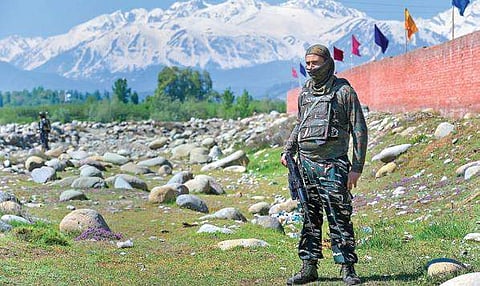

SRI NAGAR: The record drop in voter turnout in three Lok Sabha seats in the militancy-hit Kashmir Valley has raised serious questions on the relevance of mainstream political parties, with voters seeming to have lost “confidence” in the electoral system.
The Anantnag seat in south Kashmir, where polls were conducted in three phases, witnessed a record low polling of just 8.76%, the lowest since 1996.
In Srinagar and Baramulla, the other two Lok Sabha seats in the Valley, the voting percentage was the second lowest since 1996.
Academician Prof Sidiq Wahid said the low voting underlined "the complete lack of confidence in the system."
"I don’t think Prime Minister Narendra Modi’s pronouncements and language endeared him to the voters. It also points to the growing irrelevance of mainstream political parties in the Valley," he said.
The portents of a low turnout in the Kashmir Valley were all there even before the elections kicked off on April 11. Smaller crowds at election rallies, numbering in hundreds where there used to be thousands, fewer crowd engagement events by mainstream parties and a pronounced lack of will among the people to defy boycott calls by separatists, marked the run-up to the polls.
Areas such as Devsar, Noorabad, Ganderbal, Kangan, Khansahib and Chahr-e-Sharif in south Kashmir and Sumbal, Kupwara and Langate areas of north Kashmir, which used to see long poll queues, were all deserted this time.
BJP-PDP alliance blamed for the situation in J&K
National Conference provincial president Nasir Aslam Wani agreed that mainstream politics “is becoming irrelevant” and blamed the BJP-PDP alliance. “It demonised mainstream parties. There was a loss of confidence in the political system because of the 2016 unrest and the continuous targeting of Articles 370 and 35A, which grant special status and special privileges to the state.”
PDP vice president Abdul Rehman Veeri agreed, “No big rallies could be held by leaders because of the security scenario and loss of interest among the people.” Asked if mainstream parties had become irrelevant, he said, “I will not say irrelevant, but the fact is that participation decreased steeply”.
State Congress chief Ghulam Ahmed Mir said people shunned the polls as there was anger against the Modi government’s policies on Kashmir. “Besides, clubbing of polling booths and arrest of youth before polling also affected voter turnout,” he said, adding, “Governor Satya Pal Malik failed to consult political parties and polling was akin to risking oneself in no-man’s land. Had there been a civil government, this would not have happened”.
CPI (M) state secretary and ex-MLA Mohammad Yousuf Tarigami said the low voter turnout needed introspection, particularly by those at the helm in Delhi. “The muscular and security-oriented policy has added to complexities and ended all political outreach”.Zahoor Ahmad, an educated youth, blamed the PDP-BJP alliance and continued killings in the Valley since 2016 for the situation. “People have apprehensions that even if they voted for a party, it could easily become an accessory and join another for political gain, leaving us in the lurch. There is no faith left in the system anymore.”
Separatist angle
There was no voting at all in areas where people earlier used to defy separatist boycott calls and vote in large numbers. This, despite the fact that separatist leaders could not actively campaign or enforce a boycott as most are in jails